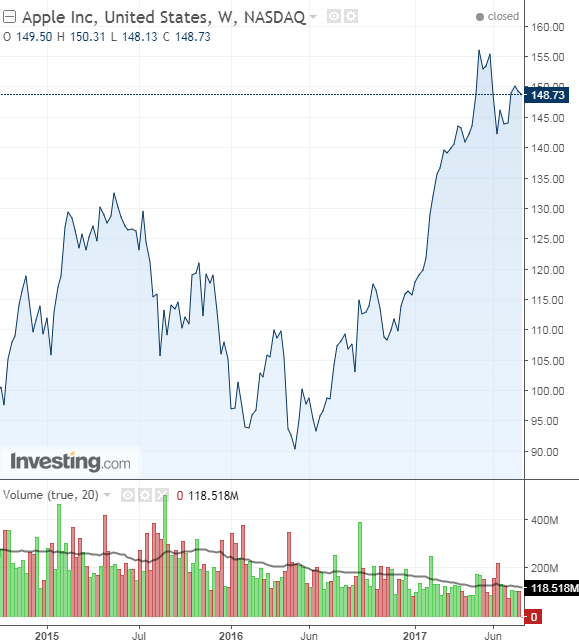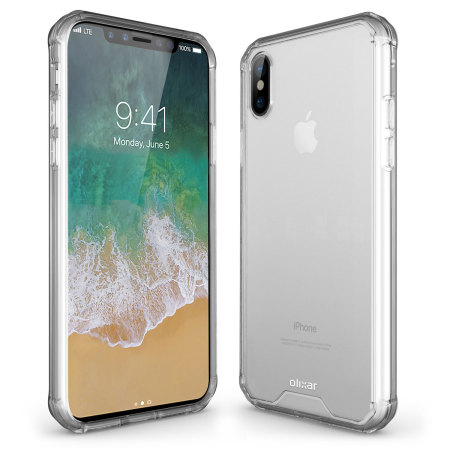by Clement Thibault
Apple (NASDAQ:AAPL) reports Q3 2017 earnings, today, Tuesday, August 1st, after the market close. Wall Street expects an EPS of $1.57 on $44.8 billion in revenue.
For now, as well as the foreseeable future, the iPhone is Apple's flagship product. Of course, Apple, the mobile communication and personal computer giant built on the Macintosh but thriving currently via the iPhone, isn't just any company—it's the US-based global colossus with the $780B market cap, the largest company in the world by valuation. That carries a lot of weight.

The iPhone has always been the primary revenue generator for Apple. In Q2 of this year, that amounted for 62.8% percent of Apple's total revenue, or $33 billion dollars. The iPhone can also be given credit for bringing in at least half of the company's revenue from services, $7 billion, making the iPhone's true direct and indirect revenue contribution even higher.
It's not surprising then, that a new iPhone release generates considerable attention and not just because of the potential revenue boost. There's a lot riding on this next iteration of the iPhone.
For starters, 2017 marks the tenth anniversary of Apple's smartphone. And ever since 2012, new versions of the phone have always been released in September, for a variety of reasons discussed below. Rumors of production delays currently put this date out of reach for the iPhone 8 release.
iPhone users are infamous for their extreme—some might even say rabid—brand loyalty and routinely rank as one of the most loyal customer bases among all consumers. A recent study by Morgan Stanley found that 92% of iPhone owners plan to stick with the brand for the foreseeable future. A disappointing product or severe miss on the release could disillusion the faithful.
Clearly, whether for investors or technology enthusiasts, the iPhone 8 is one of the company's most exciting releases in years, perhaps not since the iPhone 6 which was what we consider to have been Apple's most recent, significant upgrade, and generally considered to have been the last real upgrade in the phone's 'super-cycle'. Late to the gate on the release won't cut it with loyalists, and could go a long way toward damaging both the brand and upcoming quarterly numbers.
Based on the level of uncertainty and excitement surrounding the still-to-be-seen iPhone 8, here are the six things we believe could make or break the launch of the next iteration of Apple's flagship device.
1. No Looking Like Those Leaked Images
Manufacturers of iPhone cases have already begun taking orders for covers for the new smartphone, and most have based their renderings on the latest leaks from various sources including Bloomberg and cnet. The expectation is that Apple will finally retire the home button and minimize side bezels. Here's how Olixar, one case manufacturer, expects the new iPhone to look:

The general consensus strongly favors this design. It still looks like an iPhone but is clearly a redesigned and rethought version of Apple's popular mobile phone. And because its an Apple product, the design of the phone will be crucial, both toward making a good first impression but also as a way of highlighting the device's innovative changes. While there are similarities to Samsung's (OTC:SSNLF) Galaxy S8, an iPhone that looks like this will undoubtedly grab consumer attention.
2. Dual Camera To Support AR
We live in a visually oriented world. Applications such as Instagram (NASDAQ:FB) or Snapchat (NYSE:SNAP) have enriched their developers and owners in part by banking on the growing popularity of augmented reality (AR) a trend that augers a further move away from words toward more visual media. As such, the camera might just be the single most important piece of hardware on a smartphone.
In addition to the growing dominance of visuals, Pokémon Go proved the potential appeal of AR. The mobile game famously layered its imaginary little creatures over the real life world as viewed by a smartphone's camera. A dual camera would provide better depth perception and more realistic placement of digital imagery on real objects as well as afford advanced AR capabilities. With Facebook alongside many other developers already putting efforts into developing AR capable software, not having AR capable hardware would be a tremendous blow for the iPhone and Apple.
3. Major Improvements To iOS 11
If we're being honest, this isn't simply about the iPhone, but rather about the entire Apple ecosystem. In June, Apple introduced HomePod, its answer to smart home devices already on the market including Google Home (NASDAQ:GOOGL) and Amazon's (NASDAQ:AMZN) Alexa. Apple is very late to the game, and its device will only be available in December.
This point isn't just about the HomePod however, it's crucial for the iPhone as well. Siri once led the field among handheld smartphone assistants, but has largely become a gimmick, seldom used by costumers. As we head into the era of artificial intelligence and revenue from services becomes an even more significant percentage of Apple's earnings (services were 13.3% of Apple's revenue in Q2 2017 compared to 11.8% and 8.6% in Q2 2016 and 2015, respectively), the company needs to improve its infrastructure for providing services, and that all starts with the software. The Apple store is set to receive a redesign of the new iOS version. That, alongside Siri, will be the two primary funnels for service provision in the future, thus key to Apple's long-term success.
4. Supply Arrives On Time And Satisfies Demand
It's neither a mistake, nor a nod to legacy that iPhones are historically launched in September. September is the perfect time to launch a product that has the probability of being a huge seller during the Christmas season. The timing also affords time for production ramp-up earlier in the year in order to satisfy holiday demand, with enough of a window to iron potential issues before the crucial Christmas selling season. Last Christmas Apple sold 78.3 million iPhone devices, totaling $54.3 billion dollars, at an average of $690 in revenue per unit. For comparison, a non-holiday quarter usually sees about 50 million devices sold.
But if, as is feared, the iPhone 8 doesn't launch on time, the numbers could be significantly different for the quarter and the full year. Analysts for both Morgan Stanley and Bank of America with access to Apple suppliers in Asia issued reports stating there are concerns that problems with some of Apple's newest features, such as the camera, may delay the launch by a month or two. Apple's new AirPods are still very difficult to get hold of. The Apple Store is currently displaying a notice that the earbuds will 'ship within 6 weeks.' Additionally, there's some concern about the implementation of the Touch ID sensor within the display, though that remains an unconfirmed rumor at this point.
Launching in October rather than September wouldn't be a huge deal, though it would adversely affect Apple's Q4 sales (July-September). Still the numbers and situation would iron themselves out in the end.
The real concern would be if Apple missed the holiday season altogether. That could cost Apple billions in lost revenue. Hopefully, it won't come to that.
5. Qualcomm / Intel Swap-Out
Qualcomm (NASDAQ:QCOM) and Apple are embroiled in a legal battle over patents and licensing issues. We covered that in depth, here. Because of the legal tangle, Apple is reportedly looking to drop Qualcomm from its list of suppliers, and use Intel's (NASDAQ:INTC) modems instead. Right now, it looks as though some of the next iPhones will be powered by Qualcomm and some by Intel.
The problem here is that Qualcomm's technology is superior, and supports Gigabit LTE – new technology which allows for faster cellular network speed – something the Intel chips don't do. In order to ensure similar performance for Intel-powered devices, Apple might have to slow the Qualcomm chips to Intel speed – providing an advantage to competitor phones such as the Galaxy S8 in cellular network speed. Apple's feud with Qualcomm is already hurting Qualcomm, but Apple might not escape unscathed.
6. Competitive Pricing
According to recent estimates, the new iPhone is expected to be pricey. Some believe the list price will be $1200 per device or higher, while others assume a somewhat more reasonable $1000.
Pricing a product is both a science and an art. If the price is too low the company could miss out on critical revenue, but if it's too high entire consumer segments could be locked out. Apple products have always carried a premium price, which consumers have grown used to. However, at $1200 or higher, this new phone would be more than twice the price of the Galaxy S8.
Apple diehards might not be fazed by the price tag. However, there's a large swathe of consumers who are value oriented. As well, many Apple users are teenagers; their parents might not be eager—or willing—to shell out for the phone, pushing them instead to the competition.
Conclusion
The iPhone is crucial for Apple's growth, not only because of devices sold, but possibly too for the most overlooked segment of Apple's revenue – services. A healthy customer base with iPhones in hand would be a lot easier to up-sell and cross-sell to versus owners of Android devices the company might wish to convert.
Apple has been hoarding cash for the past few years and now has about $250 billion set aside. This is great news and should allow Apple lots of flexibility as they pursue new growth opportunities. The problem is that analysis of the company always points to its cash hoard, but there's never been any evidence that Apple actually puts this cash to good use.
It's virtually impossible, given its size and prevalence in the marketplace, to ignore Apple and its potential benefit as holding. However, based on Apple's renewed revenue growth, historical valuation and current position in the mobile world, we see fair value today at $135, a bit lower than yesterday's closing price per share of $149. The market is already pricing in some of the excitement over the new iPhone, which means the current share price reflects sentiment rather than pure fundamentals.
Right now, we still believe Apple will somehow manage to release the iPhone 8 in time for the holiday season and that the device itself will satisfy customers. On the other hand, our worst case scenario either sees Apple sacrificing quality to release on time, or miss the holiday season altogether as they iron out problems. Taking into account that Apple is riding high on sentiment rather fundamentals, we wouldn't be surprised to see a reversal of that sentiment bring the stock below $100 if the company disappoints.
